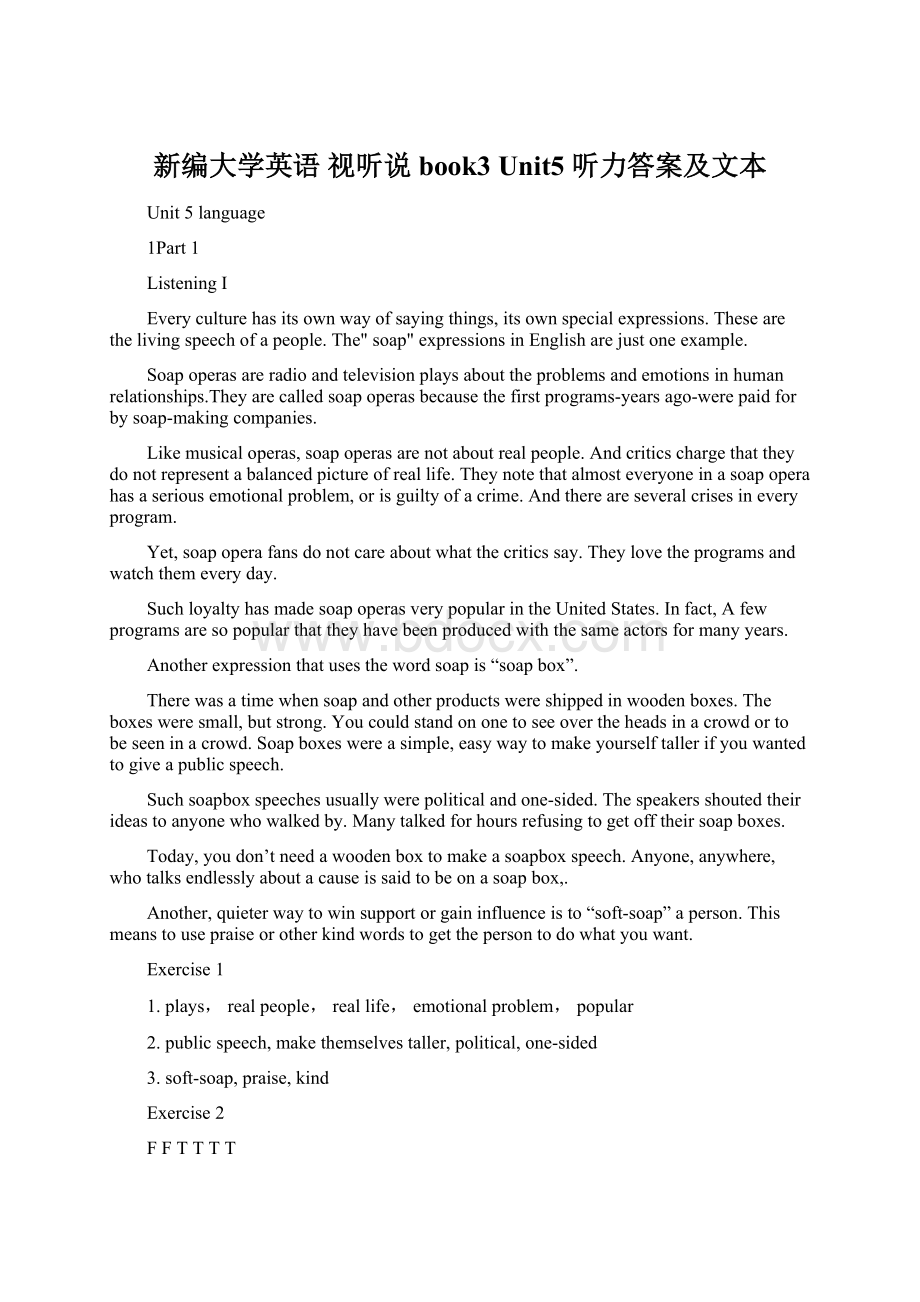新编大学英语 视听说 book3 Unit5 听力答案及文本.docx
《新编大学英语 视听说 book3 Unit5 听力答案及文本.docx》由会员分享,可在线阅读,更多相关《新编大学英语 视听说 book3 Unit5 听力答案及文本.docx(12页珍藏版)》请在冰豆网上搜索。

新编大学英语视听说book3Unit5听力答案及文本
Unit5language
1Part1
ListeningI
Everyculturehasitsownwayofsayingthings,itsownspecialexpressions.Thesearethelivingspeechofapeople.The"soap"expressionsinEnglisharejustoneexample.
Soapoperasareradioandtelevisionplaysabouttheproblemsandemotionsinhumanrelationships.Theyarecalledsoapoperasbecausethefirstprograms-yearsago-werepaidforbysoap-makingcompanies.
Likemusicaloperas,soapoperasarenotaboutrealpeople.Andcriticschargethattheydonotrepresentabalancedpictureofreallife.Theynotethatalmosteveryoneinasoapoperahasaseriousemotionalproblem,orisguiltyofacrime.Andthereareseveralcrisesineveryprogram.
Yet,soapoperafansdonotcareaboutwhatthecriticssay.Theylovetheprogramsandwatchthemeveryday.
SuchloyaltyhasmadesoapoperasverypopularintheUnitedStates.Infact,Afewprogramsaresopopularthattheyhavebeenproducedwiththesameactorsformanyyears.
Anotherexpressionthatusesthewordsoapis“soapbox”.
Therewasatimewhensoapandotherproductswereshippedinwoodenboxes.Theboxesweresmall,butstrong.Youcouldstandononetoseeovertheheadsinacrowdortobeseeninacrowd.Soapboxeswereasimple,easywaytomakeyourselftallerifyouwantedtogiveapublicspeech.
Suchsoapboxspeechesusuallywerepoliticalandone-sided.Thespeakersshoutedtheirideastoanyonewhowalkedby.Manytalkedforhoursrefusingtogetofftheirsoapboxes.
Today,youdon’tneedawoodenboxtomakeasoapboxspeech.Anyone,anywhere,whotalksendlesslyaboutacauseissaidtobeonasoapbox,.
Another,quieterwaytowinsupportorgaininfluenceisto“soft-soap”aperson.Thismeanstousepraiseorotherkindwordstogetthepersontodowhatyouwant.
Exercise1
1.plays,realpeople,reallife,emotionalproblem,popular
2.publicspeech,makethemselvestaller,political,one-sided
3.soft-soap,praise,kind
Exercise2
FFTTTT
ListeningII
A:
DoyouthinklearnersshouldtrytospeakEnglishwithanative-speakerpronunciation?
B:
That'sadifficultquestiontoanswer.Ithinkthemostimportantthingistobeunderstoodeasily.Formostlearners,it'snotnecessaryordesirabletospeaklikeanativespeaker.Forsomelearners,forexample,thosewhoeventuallywanttoteachEnglish,orbeinterpretersperhaps,anative-speakerpronunciationistheultimategoal.Atleast,that'swhatIthink.
A:
ChildrenoftendonotwanttospeakEnglishwithanative-speakerpronunciation.Whynot?
B:
Ingeneral,childrenaresplendidmimicsandimitatestrangesoundsveryeasilyandwell.However,itistruethatmostchildrendonotwanttosound"English"whentheyarespeakingEnglish.ThismaybepartlyduetoshynessbutIthinkthemainreasonisthatmostchildrenwanttobelongtoagroup—theydressalike,listentothesamemusic,sharethesameopinionsandhobbies.EvenifachildcanspeakEnglishlikeanativespeaker,heorshewillusuallychoosenotto—unless,ofcourse,therestofthegroupspeakswithanative-speakerpronunciationtoo.
A:
Whatisthemainreasonwhyadultsfindpronunciationdifficult?
B:
Numerousreasonshavebeenofferedforthedifficultieswhichmanyadultsfindwithpronunciationand,nodoubt,thereissometruthinallofthese.Itseemstobethecasethatchildrenarebettermimicsthanadults.Butifanadultreallywantstoachieveanative-speakerpronunciation,thenheorshecan.ItisNOTthestudent'sownlanguagethatpreventshimorherfromachievinganative-speakerpronunciationinEnglish.Itisthefactthattheadultstudenthasastrongsenseofnationalidentity.Inotherwords,heorshewantstobeidentifiedasaGermanorBrazilianspeakingEnglish.Inmyopinion,thissenseofnationalidentityismoreimportantthanotherexplanations,suchasthegreateranxietyofadultsortheeffectoftheirownlanguagehabits.
Exercise1
1C2A3D
Exercise2
1.beunderstoodeasily
2.necessary,desirable
3.splendid
4.prevent,fromachieving
5.anxiety,effect
ListeningIII
(Dr.Mallardisanexpertonbilingualeducation.Shehasashowonradiothroughwhichsheanswersquestionsfromparentsabouthowtoraisetheirchildrentobebilingual.)
Dr.Mallard:
Hello,sir.Youareonair.
John:
Oh,hello.Dr.Mallard?
Dr.Mallard:
Yes,HowmayIhelpyou?
John:
Dr.Mallard,mynameisJohn.MywifeMariaandIjusthadourfirstbabygirl.
Dr.Mallard:
Congratulations,John.Youmustbeveryexcited.
John:
Yes,weareindeed.HereiswhyIcalled.MariaisfromPeru,andspeaksfluentSpanishandfairlygoodEnglish,dependingonthesituation.IamanativeEnglishspeakerandIalsospeakalmostfluentSpanish.WeliveintheU.SandcommunicateinSpanishathome95%ofthetime.
Dr.Mallard:
Isee.Pleasegoon.
John:
Myquestionisthis:
howshouldwecommunicateinordertoensurethebilingualsuccessofourchild?
Dr.Mallard:
OK.FromwhatyoutoldmeIguessyouandyourwifehavealreadystartedusingmostlySpanishwithyournewborngirl.Isthatcorrect?
John:
Yes.IthinkusingSpanishwithherjustfeelskindofnaturaltobothofus.
Dr.Mallard:
Thatisfine,becauselanguageuseswithinafamilyshouldbenatural:
weusethelanguagestobuildafamilyrelationship,notto“teach”thelanguages.
John:
ButisitreasonabletoassumethatourbabywillbeexposedtoenoughEnglishintheworldoutsideourhouseandthereforeitwillbeOKforustospeaktoheralmostsolelyinSpanish?
Dr.Mallard:
Well,inmyopinion,yes.AndIalsobelievethatyourbabywillhavealotofexposuretoEnglishathomeaswell.ShewilllistentonotonlymusicandtalkontheTV,butalsorelativeandfriendswhoarevisitingortelephoning.Besides,shemayalsohaveEnglishinputfromyouyourself:
forexample,youmaywanttosingtohertheEnglish-languagenurseryrhymesthatyourememberfromyourownchildhood.
John:
Ok.Thatreallyeasesmymind.Thankyousomuch,Dr.Mallard.
Dr.Mallard:
Youarewelcome.
Exercise1
TFFFTT
Exercise2
1.fairlygood
2.ensure,success
3.natural,familyrelationship
4.exposure
5.visitingortelephoning
ListeningIV
Talkshowhost:
Welcometotonight'sprogram.OurguestisDr.CharlesAdams,languagelearningspecialist.Hisbook,LearningaLanguageoverEggsandToastisonthebestsellerlist.Welcome.
Dr.Adams:
Thankyou.
Talkshowhost:
Tellusaboutthetitleofyourbook.
Dr.Adams:
First,itisimportanttoestablisharegularstudyprogram,likeplanningafewminuteseverymorningaroundbreakfasttime.
Talkshowhost:
But,ItookSpanishforfouryearsandIdidn'tbecomeaproficientspeakerofit.
Dr.Adams:
Well,wecanbecomefluentspeakersinamatterofafewminuteshereandthere.Weshouldfollowaregularcourseofstudyandrememberthatthereisadifferencebetweennativefluencyandproficiencyinalanguage.Iproposethelatter.
Talkshowhost:
Whatarethebasickeysyousuggest?
Dr.Adams:
PeoplemustorganizetheirstudybysettingrealisticandattainablegoalsSomepeoplethinktheycanlearnthelanguagein30daysandbecomediscouragedwhentheycan’t..Smallstepsarethekey.Learningfivenewwordsadayandlearningtousethemactivelyisfarbetterthanlearning30andforgettingthemthenextday.
Talkshowhost:
Um-hum.Youmentionedindividuallearningstyles.Canyouexplainwhatyoumeanbylearningstyle?
Dr.Adams:
Sure.Peoplehavedifferentwaysoflearning.Somearevisuallearnerswhoprefertoseemodelsofthepatternstheyareexpectedtolearn.Otherareauditorylearnerswhofavorhearinginstructionsoverreadingthem..Ourpreferencesaredeterminedbyfactorssuchaspersonality,culture,andpastexperiences.
TalkShowHost:
Whatisyourlearningstyle?
Dr.Adams:
Ilearnbydoing.
Talkshowhost:
Whatdoyoumeanbythat?
Dr.Adams:
Iknowitmightsoundunusual,butmovingaroundwhiletryingtolearnhelpsme.WhileIcutuptomatoesandonionsformybreakfastinthemorning,Imightrecitealoudvocabularytotherhythmoftheknife.
Talkshowhost:
Whatismylearningstyle?
Dr.Adams:
You'regoingtohavetoreadmybooktofindthatout.
Talkshowhost:
OkayThankforjoiningus.
Dr.Adams:
Mypleasure.
Exercise1
1C2C3A4B
Exercise2
1.Eggs,Toast
2.realistic,farbetterthan,forgetting
3.determined,personality,culture
4.recitealoud
Part2
VideoScript
Alice:
So,eachofushaschosensomeanimalsthatwebelieveuselanguage.Peter,whatdidyoulearnaboutwhalesanddolphins?
Peter:
Itwasthoughtthatonlyhumanscoummunicateoverlongdistances.
Alice:
How?
Peter:
Theyusehighfrequencieswhichcancarryoveralongdiatances.And,infact,researchersseemtothinkthattheseanimalsseemtohaveaneedtocommunicatewitheachother.Andoneresearcherthinksthatonedaywe’llbetoknowwhatthey’retalkingabout.
Alice:
Good!
.Henry,whatdidyoufindabout...erm..elephants?
Henry:
Ifoundthatelephantscancommmunicateoverlongdistancestoo.,buttheyuseverylowfrequencies.Idon’tkonwwhetheryoucouldcalltheircommunicationlanguageornot,butI’lllookintoitmore.
Alice:
Ok,Margaret,whataboutparrots?
Margaret:
We’veallreadaboutparrots,butI”vebeenaboutaparrotscalled,whokonws971words.Heisn’tcountedaskonwinganewwordunlesshe’suseditatleastfivetimesinameaningfulway.Inotherwords,ifhejustrepeatstheword,itdoesn’tcount.
Alice:
DoyouhaveanyexamplesofNkisi’slanguageuse?
Margaret:
Yes.ItinvolvesJaneGoodall,thefamousanthropoloqist.ShewenttoseeNkisi.Nkisi’sownerhadshownhimsomepicturesofJaneandsomechimpanzees.WhenJanewalkedintotheroom,Nkisisaid,”Gotachimp?
”
Peter:
That’funny.
Al